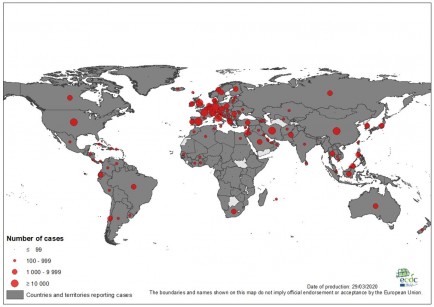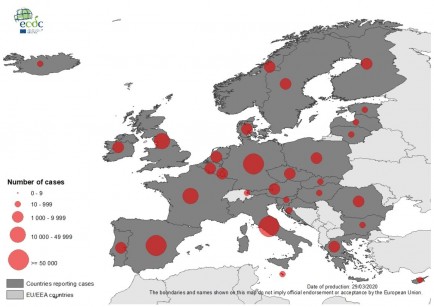CORONAVIRUS has acquired a new name as cases of the disease push the world into a public health crisis, with more than 200,000 globally. What does COVID-19 stand for?
What does COVID-19 stand for?
When it emerged, the virus was known as a “novel” strain of the coronavirus family. Scientists gave the strain an interim name of 2019-nCoV, accounting for the year of discovery, its status as a “novel” virus, and its family name (CoV). The new designation, while different, represents the same information.
COVID-19 stands for Corona Virus Disease 2019. The World Health Organization (WHO) announced the official designation on Tuesday and commented on the importance of the name. Tedros Adhanom Ghebreyesus, Director-General of the WHO, said the organisation was mindful to prevent “stigmatising” names.
He said: “Having a name matters to prevent the use of other names that can be inaccurate or stigmatising.
“It also gives us a standard format to use for any future coronavirus outbreaks.”
The WHO added via Twitter: “Under agreed guidelines between WHO, the @OIEAnimalHealth & @FAO, we had to find a name that did not refer to a geographical location, an animal, an individual or group of people, and which is also pronounceable and related to the disease”.
According to experts, the name of a disease is instrumental during an outbreak. Speaking to TIME Magazine, Wendy Parmet, a law professor at Northeastern University, said if scientists name a disease after its country of origin, perceived stigma may make people hesitant to come forward.
She said: “People tend to think of the disease as belonging to, as being a characteristic of some group of people associated with the place name, which can be really stigmatising.
“To be thought of as a hole of disease is not going to be productive.
“It encourages the next city not to come forward, not to report a disease if your city is labelled as the disease.”
The name of the latest coronavirus outbreak has taken increased importance as Chinese residents in the UK have revealed “shocking” levels of racism. Manchester-born legal adviser Jason Ngan told The Guardian anti-Asian racism in his city has peaked in the wake of the coronavirus outbreak. He said: “People seem to have put a whole race behind it and it’s exposing all these underlying prejudices towards Chinese people, or at least anyone who looks Chinese.
“It’s shocking in this day and age.”
The Manchester Chinese Centre reported racist incidents targeting Asian children across the region,.
While the University of York released a statement last week calling for respect and tolerance in the face of xenophobic comments directed towards its students on Yorfess, its anonymous confession page.
How many cases of coronavirus are near you?
Coronavirus cases in the UK are increasing every day. The Government has now progressed to the delay phase of the four-step coronavirus plan. Under the latest advice, anyone living in a household with somebody who has the symptoms of a persistent cough or fever was told to isolate themselves for 14 days.
You can find the latest UK tracker here.
What is the difference between self-isolating and quarantine?
Isolation is a method used to separate an ill person from those who are healthy. As coronavirus can be spread from person to person, isolation restricts the movement of someone who is ill to prevent the spread elsewhere. Quarantine is used to restrict the movements of a well person who may have become exposed to a communicable disease.
Original article: https://www.express.co.uk/life-style/health/1241302/Coronavirus-named-COVID-19-meaning-WHO-coronavirus-latest-update




























Comments